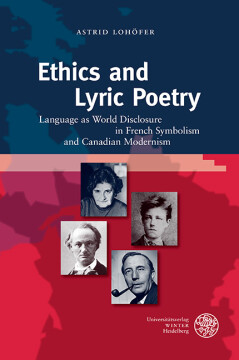
BUCH
Ethics and Lyric Poetry
Language as World Disclosure in French Symbolism and Canadian Modernism
Britannica et Americana. 3. Folge, Bd. 30
2014
Zusätzliche Informationen
Bibliografische Daten
Abstract
This book examines the relationship between ethics and modernist poetry, arguing that the ethical implications of these texts are inseparable from their creative use of Language. Most studies in the field of ethical criticism either focus on the transmission of moral values in prose works, thus ignoring the genre of poetry, or re-define ethics as an aesthetic category, thereby bypassing the concrete ethical concerns of individual texts. This study proposes an alternative conception of poetic Language, which considers the linguistic creativeness of literature as a means of ethical world-disclosure, i.e., as a dynamic tool of revealing aspects of the world that remain hidden in ordinary discourse. The readings of poems by Baudelaire, Rimbaud, Scott, and Livesay suggest that the world-disclosing function of poetic Language is not only crucial to the understanding of modernist ethics, but also a way to bridge the gap between moralist and aestheticist approaches to literary interpretation.
Inhaltsverzeichnis
| Zwischenüberschrift | Seite | Aktion | Preis |
|---|---|---|---|
| Table of Contents | 7 | ||
| Acknowledgements | 9 | ||
| General Introduction | 11 | ||
| Part one “Poetry makes nothing happen”:Ethics and Literary Criticism | 23 | ||
| Introduction to Part One | 25 | ||
| I “Stories are our major moral teachers”: Towards an Ethical Criticism | 31 | ||
| 1 Choosing the Right Company: Authors and Characters as Friends | 36 | ||
| 2 Gaining Practical Wisdom: Literature as Moral Philosophy | 42 | ||
| 3 Accepting the Limits of Language: Reading as an Experience of Undecidability | 48 | ||
| 4 Re-inventing Oneself: Literature as a Source of New Vocabularies | 55 | ||
| II “Poetically man dwells”: Towards Ethics in Lyric Poetry | 65 | ||
| 1 Lyric versus Ethics: The Paradigm of Modernist Aestheticism | 71 | ||
| 2 Epi- versus Graphi-Reading: The Problem of Language in Ethical Criticism | 78 | ||
| 3 World-Disclosure and Living Metaphors: Beyond Epi- versus Graphi-Reading | 86 | ||
| 4 Ethics and Lyric Language: Beyond Meta-Ethical Considerations | 96 | ||
| Conclusion to Part One | 103 | ||
| Part two “La Poésie ne rythmera plus l’action,elle sera en avant”:Ethics and French Symbolism | 105 | ||
| Introduction to Part Two | 107 | ||
| III “Trouver du nouveau”: Charles Baudelaire | 115 | ||
| 1 “Par un décret des puissances suprêmes”: The Poet’s Ethical Task | 120 | ||
| 2 “Je cherche le vide, et le noir, et le nu”: Poetry as Word-Disclosure | 126 | ||
| 3 “T’infuser mon venin, ma soeur!”: Aesthetic Renewal as Moral Critique | 131 | ||
| 4 Baudelaire as a “parfait comédien”: Ethical Reflection under Censorship | 138 | ||
| IV “Trouver une langue”: Arthur Rimbaud | 147 | ||
| 1 “Il dort dans le soleil”: Unveiling the Rhetorics of War | 151 | ||
| 2 “Ils se ressentent si bien vivre”: Challenging the Discourse of Salvation | 158 | ||
| 3 “Et mon bureau?”: Confronting Ignorance | 165 | ||
| 4 “Un bateau frêle comme un papillon de mai”: Creating Utopia | 173 | ||
| Conclusion to Part Two | 187 | ||
| Part three “The aim of poetry is to illuminate the worldand mankind’s task within it”:Ethics and Canadian Modernism | 189 | ||
| Introduction to Part Three | 191 | ||
| V “A new dimension of thought and feeling”: F. R. Scott | 197 | ||
| 1 “How shall I hear old music?”: Between Ethics and Aesthetics | 203 | ||
| 2 “A new language in birds”: Against Ossified Conceptions of Art | 212 | ||
| 3 “Nothing can take its place”: Towards a Recognition of Poetry’s Ethical Power | 218 | ||
| 4 “But a deeper note is sounding”: Beyond the Dualism of Civilization and Nature | 223 | ||
| VI “Language defines our life, our relationships”: Dorothy Livesay | 237 | ||
| 1 “Forgive us our distances”: Suffering from Gender Binaries | 242 | ||
| 2 “Meanings bound re-bound”: Striving for a New Dimension of Poetic Experience | 249 | ||
| 3 “Invert the world”: Unleashing Language | 258 | ||
| 4 “Woman in man, and man in womb”: Achieving Self-Completion | 265 | ||
| Conclusion to Part Three | 275 | ||
| General Conclusion | 277 | ||
| Works cited | 283 | ||
| Index of Names and Works | 315 |


 Publishing Platform by CloudPublish
Publishing Platform by CloudPublish